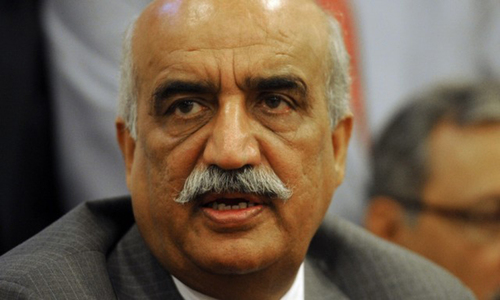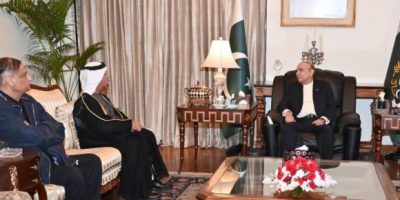PPP, JI to oppose reinstatement of military courts

JAN 10, (DNA) – Chairing a consultative meeting of opposition parties regarding the revival of military courts, opposition leader Khursheed Shah on Tuesday said the Pakistan People’s Party (PPP) will oppose the reinstatement of military courts.
The veteran politician chaired a consultative meeting of opposition parties a day after the federal government initiated consultations to introduce a constitutional amendment reinstating the controversial courts for a period of time all political parties agreed upon.
Also in attendance at the meeting were Pakistan Tehreek-i-Insaf (PTI) senior leader Shah Mahmood Qureshi and PTI’s chief whip in the National Assembly Shireen Mazari, PPP’s Naveed Qamar, and Jamaat-i-Islami’s Tariqullah.
Speaking to journalists about the PPP’s stance on the revival of military courts, Shah said, “This has been our point of view since day one.”
The JI declared that they, too, would oppose the reinstatement of military courts.
PTI’s Qureshi said the PTI would first listen to the government’s point of view on the subject and then present its own.
Later today, the opposition parties are expected to hold a meeting with National Assembly Speaker Ayaz Sadiq.
Pakistan had legalised military court trials of terror suspects for a period of two years in January 2015, soon after the terror attack on Peshawar’s Army Public School in Dec 2014, in which 144 people, most of them children, were killed by Tehreek-i-Taliban Pakistan militants.
The two houses of parliament had on that occasion voted unanimously for the legislation despite fears among the lawmakers that the tribunals they were authorising would not be able to ensure due process to the suspects and might undermine democracy.
An All Parties Conference (APC) gave the green light for the amendments to the Pakistan Army Act to extend its jurisdiction for speedy trial of cases under specified acts and provide the constitutional cover with a sunset clause of two years from the date of enactment.
At first the 21st Amendment, as it is popularly known, was met with much debate, but over time, military courts wove themselves into the fabric of Pakistan’s criminal justice system.
The controversial special powers empower military courts to try civilian terror suspects along with affording these proposed tribunals constitutional protection.
Military courts do not grant convicts the essential components of a fair and free trial, as they lack in transparency and do not allow convicts the option to appeal to civilian courts.=DNA
==========
Related News

Bidding for 75% PIA stake takes place on Tuesday
ISLAMABAD, DEC 22 – The government will hold open bidding for the privatisation of 75%Read More

UAE ambassador meets President Zardari to discuss deepening bilateral relations
ISLAMABAD, DEC 22 – Ambassador of the United Arab Emirates (UAE) to Pakistan Salem MohammedRead More


Comments are Closed